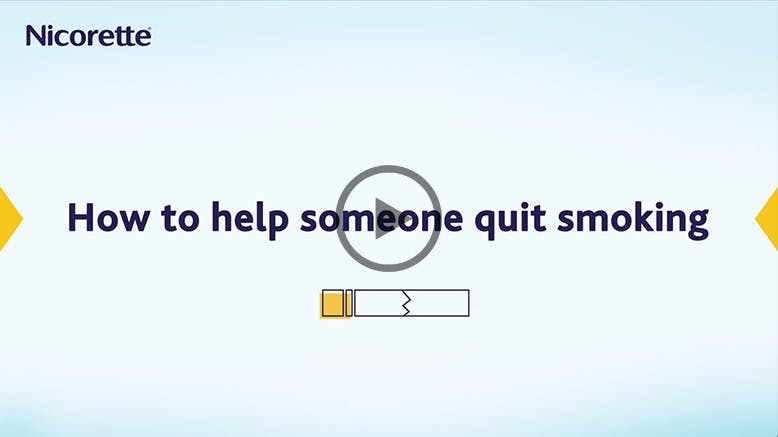
How to Help Someone Who's Trying to Quit Smoking
If your family member or friend is a smoker, you might feel inclined to push them to quit. DON’T. Quitting smoking is a very personal thing to do. When talking with a smoker, your goal shouldn’t be to bully them into quitting, but rather help them realize they need to. To navigate this sensitive topic, here are some tips on what you can do to support.
Starting the Conversation
If you have a friend or family member you’d like to help quit smoking, just getting the conversation started can be the hardest part. Your goal should be to guide your friend into telling you they want to quit rather than you telling them they need to quit. To get the ball rolling, here are some tips to getting your friend or loved one to start talking about quitting smoking.
- Get their permission to talk about their smoking habits by asking a question like “May I tell you what concerns me about your smoking?”
- Ask open-ended questions, like “How would your life be different if you didn’t smoke?”
- Be encouraging and offer affirmations, not judgments. “You really tried hard this week” or “You are such a strong person” are good places to start.
- Listen reflectively by paraphrasing what they have said with no inflection, and hypothesize about what they are thinking and feeling.
- Summarize what they’ve told you with phrases like “I’d like to try and pull together what you’ve said so far - let me know if I miss something important.”
- The final step is to really find out what they’re thinking about the idea of quitting smoking. You can do this by asking questions like “So where does this leave you?” and “So what are you thinking at this point?”
Once the conversation has started, make sure you can explain the benefits of why your friend should quit smoking. What’s in it for them? Here are some of the very best reasons to quit smoking. Close
Starting the Conversation
If you have a friend or family member you’d like to help quit smoking, just getting the conversation started can be the hardest part. Your goal should be to guide your friend into telling you they want to quit rather than you telling them they need to quit. To get the ball rolling, here are some tips to getting your friend or loved one to start talking about quitting smoking.
- Get their permission to talk about their smoking habits by asking a question like “May I tell you what concerns me about your smoking?”
- Ask open-ended questions, like “How would your life be different if you didn’t smoke?”
- Be encouraging and offer affirmations, not judgments. “You really tried hard this week” or “You are such a strong person” are good places to start.
- Listen reflectively by paraphrasing what they have said with no inflection, and hypothesize about what they are thinking and feeling.
- Summarize what they’ve told you with phrases like “I’d like to try and pull together what you’ve said so far - let me know if I miss something important.”
- The final step is to really find out what they’re thinking about the idea of quitting smoking. You can do this by asking questions like “So where does this leave you?” and “So what are you thinking at this point?”
Once the conversation has started, make sure you can explain the benefits of why your friend should quit smoking. What’s in it for them? Here are some of the very best reasons to quit smoking. Close

Once the conversation has started, make sure you can explain the benefits of quitting smoking. Here are some of the very best reasons.
Help support a friend through withdrawal
When your friend or family member quits smoking, they will most likely experience some nicotine withdrawal symptoms. These vary by person, but for most people, the worst of the symptoms peak at ten days. Knowing what some of these symptoms are can enable you to help your friend through them
Source: Smokefree.gov, Do I Have Nicotine Withdrawal? Apr. 2015.
According to the National Cancer Institute, NRT delivers measured doses of nicotine, which helps to relieve cravings and withdrawal symptoms people may experience when quitting smoking. NRT is an effective treatment that can increase the likelihood of quitting smoking.
Help support a friend through withdrawal
When your friend or family member quits smoking, they will most likely experience some nicotine withdrawal symptoms. These vary by person, but for most people, the worst of the symptoms peak at ten days. Knowing what some of these symptoms are can enable you to help your friend through them
Read Less
What you can do
- Remind them that these symptoms are temporary
- Spend time with them or go for a walk
- Recommend meditation or other relaxation techniques
- Help them avoid contact with other friends who smoke
- Remind them of the benefits of quitting smoking
- Encourage them to talk to their healthcare provider about Nicotine Replacement Therapy (NRT)
Source: Smokefree.gov, Do I Have Nicotine Withdrawal? Apr. 2015.
According to the National Cancer Institute, NRT delivers measured doses of nicotine, which helps to relieve cravings and withdrawal symptoms people may experience when quitting smoking. NRT is an effective treatment that can increase the likelihood of quitting smoking.










